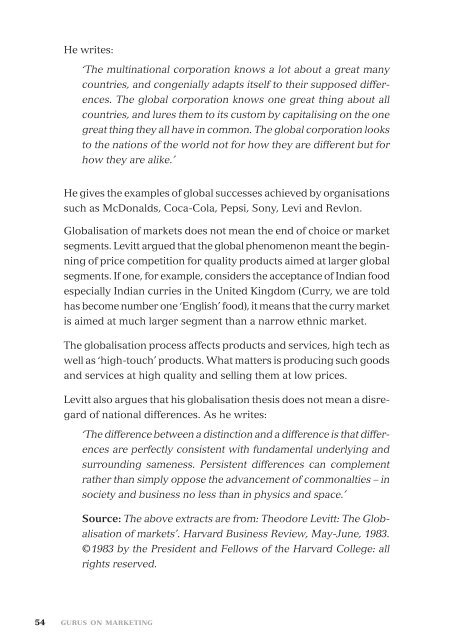Gurus On Marketing
Gurus On Marketing
Gurus On Marketing
You also want an ePaper? Increase the reach of your titles
YUMPU automatically turns print PDFs into web optimized ePapers that Google loves.
He writes:<br />
‘The multinational corporation knows a lot about a great many<br />
countries, and congenially adapts itself to their supposed differences.<br />
The global corporation knows one great thing about all<br />
countries, and lures them to its custom by capitalising on the one<br />
great thing they all have in common. The global corporation looks<br />
to the nations of the world not for how they are different but for<br />
how they are alike.’<br />
He gives the examples of global successes achieved by organisations<br />
such as McDonalds, Coca-Cola, Pepsi, Sony, Levi and Revlon.<br />
Globalisation of markets does not mean the end of choice or market<br />
segments. Levitt argued that the global phenomenon meant the beginning<br />
of price competition for quality products aimed at larger global<br />
segments. If one, for example, considers the acceptance of Indian food<br />
especially Indian curries in the United Kingdom (Curry, we are told<br />
has become number one ‘English’ food), it means that the curry market<br />
is aimed at much larger segment than a narrow ethnic market.<br />
The globalisation process affects products and services, high tech as<br />
well as ‘high-touch’ products. What matters is producing such goods<br />
and services at high quality and selling them at low prices.<br />
Levitt also argues that his globalisation thesis does not mean a disregard<br />
of national differences. As he writes:<br />
‘The difference between a distinction and a difference is that differences<br />
are perfectly consistent with fundamental underlying and<br />
surrounding sameness. Persistent differences can complement<br />
rather than simply oppose the advancement of commonalties – in<br />
society and business no less than in physics and space.’<br />
Source: The above extracts are from: Theodore Levitt: The Globalisation<br />
of markets’. Harvard Business Review, May-June, 1983.<br />
©1983 by the President and Fellows of the Harvard College: all<br />
rights reserved.<br />
54<br />
GURUS ON MARKETING










